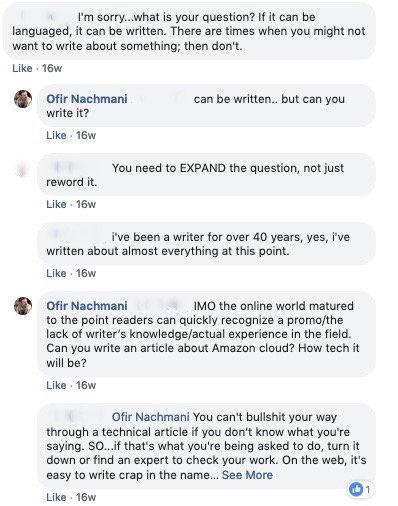It’s no secret anymore that strong writers have become a hot commodity at tech companies–and I’m talking about writers of sentences, not code. But can a given writer write about just anything?
Recently, I started a discussion on one of the largest Facebook writer groups. The question I posed was this:
“Can you write about anything?”
I was amazed to see that most of the respondents answered:
“Yes, I can write about anything.”
I admit, the question was a bit antagonistic, a method for checking out the marketplace of writers out there today. I spend time researching the world of content and wanted to learn how writers relate to their given area of expertise, if at all. But I also was looking to prove a point: No writer can write about anything.
How to Touch a Writer’s Nerve
Although I have been working in and blogging about content marketing for more than a decade, I’ve never understood how a writer, even the most veteran writer, can claim to be able to write about anything. Especially when it comes to technology, I think this may be an exaggerated claim.
Certainly an experienced journalist knows how to interview someone expertly enough to be able to communicate a message to a general audience. But to claim to be able to write anything… even about topics, and for an audience, that require an insider’s view, hands-on experience, and expertise? Come on.
One of the commenters on the Facebook thread in response to my question stated this:
“I’ve written about almost anything.”

At the end of the day, it seems as if this commenter agreed with me even if she couldn’t admit to it. She did change the original “I” to “you,” implying that if someone else didn’t know what they were talking about, they should turn down a gig. But what I was trying to point out was that often times writers don’t do this very thing: turn down a gig if they aren’t certain they can write an article that goes deeply enough. They instead take the gig and end up churning out high quality “fluff.”
I would never underestimate the value of a writer to an organization, and we at IOD recruit top writers who can claim a wide range of experience on numerous topics. But when it comes to the reliability and accuracy of tech content, in particular, we would never count on the writer alone. No way. Never. I mean, how can a writer–whose expertise is in writing–really provide expertise on docker containers or AWS Fargate or how to pass an Azure exam?!
Now, if you’re an experienced tech pro, you’ve probably been nodding along with me since the beginning of this post. But, if you’re a professional paid writer, you might still not be convinced. I know that when I recently posted a version of this claim on Twitter, lots of writers were not convinced. Further, a few were so offended by the suggestion they said I clearly did not “know the community.”
Are you a dissenter, still? I am happy to continue listening to your opinions on this, but in the meantime, read on.
If you’re a tech blogger, you’ll find this post especially interesting, as I’m going to share a few best practices for how to work with a ghost writer.
And finally, if you’re a tech marketer, definitely keep on reading, as I’ll help you articulate what you already know but may have not fully understood or known what to do to finally address and solve this problem.
What Makes A Writer?
Here at IOD, we have the best writers: Tina, Natalie, Liz, Anthony, and all of our veteran tech marketing writers. I love them all. But a conversation we have been having at IOD for the last couple of years is around the inaccuracy of calling them “writers.” Truly, what they are doing at IOD, at least, is editing, guiding, and consulting our experts, who act as writers.
Take Tina: She has been a business professional in the world of high tech for two decades, filling a variety of roles from business plan writer to start-up CEO to marcom strategist. All of these roles have required writing, so she’s been writing about tech for just as long. It’s amazing, every time, how fast she “gets it,” whatever “it” is. She can take on a new topic and quickly create a coherent, well-written blog.
But there’s more to great tech content than terrific, experienced writers.
It Takes a Team
So, let’s say you need to create or populate a company blog. There’s you, as a content strategist or marketing professional, along with the internal SME (a tech expert), and an in-house or freelance writer.
First, you need to pick a topic, right?
You research and brainstorm. You track competitors’ blogs and listen to social media to learn what your audience wants to know.
Now, who out of the three roles I mentioned above — content strategist, SME, writer — do you think will come up with the best topic to reach your target audience? Not a single one! Why? Because the expert does not understand marketing, and the writer doesn’t know a thing about the needs of the audience. And the strategist? Well, he may know marketing and also the needs, but he may not be a strong writer, and he is unlikely a database architect, a CIO, or a senior developer with years of hands-on experience.
Good tech content creation requires a team effort—everybody’s contributes to a successful post.
Next, let’s say, you have your topic. Now what? Who can create the outline? Who’s going to specify what needs to go into the article? Which use cases should you use, and what are the main takeaways? I still maintain that neither the expert nor the writer will be able to complete a detailed outline alone! The expert doesn’t know what a ToC really is or how to turn facts into a compelling, well-structured narrative, and the writer just can’t grasp the potential pain points of the target audience, nor come up with a real use case.
And as the writer noted in the Facebook discussion above, when you find yourself in a situation where you know you are not the ONE who can answer questions surrounding a topic nor have a team to help you:
“Turn it down or find a good expert to check your work.”
Note that she started her comments with an essential “yes” to my question: She had “written about almost everything.” And yet, by the end of our conversation, she pretty much admitted that, well, maybe not “anything.”
You Need at LEAST Two to Tango…
In the early days of IOD, I asked Tina to help me run a competitive analysis of the world of content marketing at that time. As part of this project, I briefed her on our core principle:
“One-to-one will never work!”
Let me explain. IOD’s basic precept is that when creating an article you have to have at least an SME (who produces the table of contents and the first draft) and an editor (who comes in once the first draft is ready.)
All of our material created at IOD is expert-based. Sometimes the article can be written by a marketing writer who interviews an SME (2 individuals). But in that case, we also run the final product by a separate editor; as Jen, our VP business development who used to run our editorial department would insist we do. (“Every good writer needs a good editor.”) So sometimes the team is a team of three.
Returning to that meeting with Tina that day, her response to me was:
“You nailed it! Separation of duties allows our freelance professionals to stay in their comfort zone. Experts know, writers write, and editors edit.”
Now, don’t get me wrong. It’s great to dip your toes into different fields. As I noted above, Tina has extensive experience that enables her to tackle tech pieces almost like a pro. But still, we always have an expert for her to interview if needed, and another set of eyes to look over a piece, to make sure the piece is clean, reliable, and on-point.
A Team… Can Write About Anything
Today, IOD boasts an effective and streamlined content machine that generates more than a million dollars a year catering to the world of tech. Customers are happy, customer retention is high, and new business comes our way on a daily basis.
Typically, no, a writer cannot just write about anything. But with the right team, almost anything can be written for anyone.







